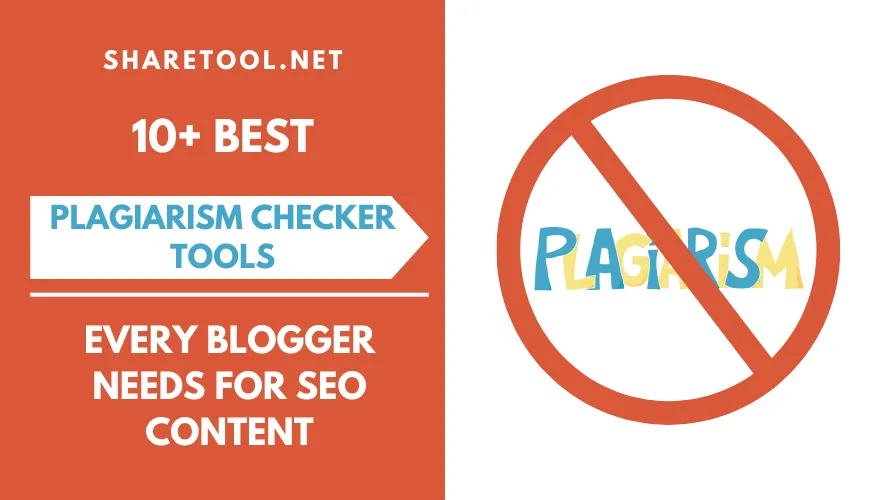10+ Best Plagiarism Checker Tools Every Blogger Needs For SEO Content
For bloggers, originality isn’t optional – it’s the foundation of SEO success. That’s why plagiarism checker tools have become essential in 2025. Publishing duplicate content doesn’t just hurt your credibility; it can tank your rankings, reduce traffic, and even put your entire site at risk of penalties from search engines.
Research shows that free plagiarism checkers detect only about 43% of copied text, while advanced tools like Scribbr reach up to 88% accuracy. This gap highlights why investing in the right tool can directly impact your content’s visibility, authority, and long-term SEO performance.
In this article, we’ll break down the 10+ tools for plagiarism checker for bloggers, compare free vs. premium options, and help you choose the solution that ensures your content remains original, trustworthy, and fully optimized for search.
What Are Plagiarism Checker Tools and Why Do You Need Them?
Plagiarism checker tools are sophisticated software applications that scan your text against vast databases of published content, academic papers, and web pages to identify potential instances of copied material. These tools analyze your text and cross-reference it against databases containing over 16 billion web pages and academic papers, providing detailed reports highlighting similar content and original sources.

Key benefits include:
- Preventing accidental plagiarism before submission
- Identifying missing citations and improper attributions
- Protecting against academic penalties and professional consequences
- Ensuring content originality for SEO and publishing purposes
- Building confidence in your written work’s authenticity
Top 10 Best Plagiarism Checker Tools (Free and Paid)
Grammarly Plagiarism Checker
Best All-in-One Writing Assistant
Grammarly‘s AI-powered plagiarism checker analyzes text against over 16 billion web pages and academic papers in ProQuest’s databases, while also providing comprehensive grammar, spelling, and style feedback.

Key Features:
- Integrates with grammar checking and writing enhancement
- Real-time plagiarism detection
- Browser extensions and document integration
- Citation assistance and auto-citations
- AI content detection capabilities
Best For: Students, professional writers, content creators
Pros:
- Complete writing assistance package
- User-friendly interface
- Strong integration with popular platforms
- Comprehensive writing feedback beyond plagiarism
Cons:
- Plagiarism checker not included in free plan
- Limited academic database compared to specialized tools
- Subscription required for plagiarism features
Turnitin
Industry Standard for Academic Institutions
Turnitin compares student work against an unparalleled repository of student papers, current and archived web pages, and premium subscription articles from top publishers across 170 languages. This tool is widely used by educational institutions worldwide.

Key Features:
- Comprehensive academic database
- Advanced similarity detection
- Integration with learning management systems
- Detailed originality reports
- Support for multiple file formats
- Anti-manipulation detection
Best For: Educational institutions, teachers, academic researchers
Pros:
- Most comprehensive academic database
- Industry standard reliability
- Advanced detection algorithms
- Institutional support and training
Cons:
- Not available for individual users
- Requires institutional access
- Can be overly sensitive with technical writing
Quetext Plagiarism Checker
Best DeepSearch Technology
Quetext uses advanced DeepSearch technology that provides contextual analysis, fuzzy matching, and conditional scoring, correctly detecting 100% of content copied from academic journals in testing.

Key Features:
- Patented DeepSearch technology
- ColorGrade visual feedback system
- Citation assistant included
- Contextual analysis beyond word matching
- Grammar checker integration
- Multiple language support
Best For: Students, researchers, academic writers
Pros:
- Advanced contextual analysis
- Strong detection of synonym swapping
- Visual feedback system
- Includes citation tools
Cons:
- Limited free plan
- Less comprehensive database than top competitors
- Can be slower with large documents
QuillBot Plagiarism Checker
Best for AI Writing Detection
QuillBot‘s plagiarism checker scans over 100 languages and is available only in Premium plans at $8.33/month, allowing scanning of 25,000 words.

Key Features:
- Multi-language support (100+ languages)
- AI writing detection capabilities
- Integration with paraphrasing tools
- Real-time analysis
- Side-by-side source comparison
Best For: Content creators, students, non-native English speakers
Pros:
- Excellent language support
- Integrated writing tools ecosystem
- Good value for comprehensive features
- Strong AI content detection
Cons:
- Plagiarism checker limited to Premium users only
- Smaller academic database
- Less accuracy compared to specialized tools to check plagiarism
Scribbr Plagiarism Checker
Best Overall Accuracy
Scribbr‘s plagiarism checker heavily outperformed all free and paid tools in terms of plagiarism detection, achieving 88% accuracy versus an average of 43% across free tools. This tool excels particularly with academic sources and detecting heavily edited plagiarized texts.

Key Features:
- Industry-leading 88% accuracy rate
- Comprehensive database including academic journals and dissertations
- Self-plagiarism checker (unique feature)
- Clear, color-coded reports for easy interpretation
- Citations generator integrated
- Multiple language support
Best For: Students, researchers, academic institutions
Pros:
- Highest accuracy in independent testing
- Excellent for detecting paraphrased content
- Strong academic database coverage
- Data automatically deleted after 30 days
Cons:
- Pay-per-use model (no free version with full features)
- Cannot edit text directly in the tool
- More expensive than subscription-based alternatives
SmallSEOTools Plagiarism Checker
Best Plagiarism Checker Free With Limitations
SmallSEOTools offers smart seo tools plagiarism checker that analyzes up to 1000 words per search and claims 100% accuracy, though independent testing shows mixed results.

Key Features:
- Completely free to use
- 1000 word limit per search
- Multiple input methods (text, URL, file upload)
- Percentage-based results
- Multiple language support
- API integration available
Best For: Content writers, bloggers, quick checks
Pros:
- No cost for basic use
- Easy to use interface
- No registration required
- Multiple search options
Cons:
- Independent testing shows it missed plagiarism that other tools caught
- Limited word count per search
- Found less than 40% of plagiarized content in testing
- Inconsistent results between scans
Copyscape
Best for Web Content Protection
Copyscape is designed for professional writers and is faster than Grammarly at finding plagiarized sources, showing percentage and exact text matches.

Key Features:
- Web-focused plagiarism detection
- Batch search capabilities
- Protected site monitoring
- API access for developers
- Case tracking for content theft
Best For: Website owners, content marketers, professional writers
Pros:
- Excellent for web content
- Fast scanning process
- Comprehensive online database
- Professional theft monitoring
Cons:
- Limited academic database
- Pay-per-search can become expensive
- Less suitable for academic work
PapersOwl Plagiarism Checker
Best Unlimited Free Checker
PapersOwl offers a completely free plagiarism checker with unlimited word count, providing detailed reports in approximately 10 seconds.

Key Features:
- Unlimited word count
- Fast 10-second scanning
- Detailed percentage reports
- Source link identification
- Free downloadable reports
- No registration required
Best For: Students on tight budgets, quick checks
Pros:
- No word limits unlike other free tools
- Fast processing time
- Detailed source identification
- No cost barriers
Cons:
- Limited database coverage
- Less accuracy than premium tools to check plagiarism
- Basic reporting features
Plagly Plagiarism Checker
Best AI-Powered Free Option
Plagly offers AI-powered plagiarism detection with up to 99.8% accuracy claims and provides instant results against billions of web pages and academic papers.

Key Features:
- AI-powered detection algorithms
- Comprehensive source database
- Grammar correction integration
- Style and structure feedback
- Citation generation tools
- Multiple language support
Best For: Students, content creators, educators
Pros:
- Advanced AI technology
- Comprehensive writing assistance
- No storage of documents
- Fast processing
Cons:
- Accuracy claims not independently verified
- Limited free usage
- Smaller market presence
DupliChecker
Best Multilingual Support
DupliChecker supports multiple languages and serves over 3,000 institutions worldwide, using advanced NLP techniques for plagiarism detection.

Key Features:
- Support for 20+ languages
- Advanced NLP algorithms
- Semantic analysis for paraphrasing detection
- Institution-grade reliability
- API integration
- Detailed reporting system
Best For: International users, educational institutions
Pros:
- Excellent language support
- Advanced semantic analysis
- Institutional trust
- Comprehensive detection methods
Cons:
- Less known brand
- Limited free features
- Smaller database than major competitors
Comprehensive Comparison Table
| Tool | Price | Accuracy | Database Size | Best For | Key Feature |
|---|---|---|---|---|---|
| Scribbr | $19.95-39.95/check | 88% | Academic + Web | Students/Researchers | Highest accuracy |
| Grammarly | $5/month | 76% | 16B+ pages | All writers | Complete writing suite |
| Turnitin | $20/month | 93% | Largest academic | Institutions | Industry standard |
| Quetext | $10/month | High | Academic + Web | Students | DeepSearch technology |
| QuillBot | $3/month | Good | 100+ languages | Content creators | AI integration |
| SmallSEOTools | Free | 40% | Web-focused | Quick checks | Completely free |
| Copyscape | Pay-per-search | Good | Web-focused | Web content | Professional protection |
| PapersOwl | Free | Basic | General | Students | Unlimited free |
| Plagly | Freemium | Claims 99.8% | Academic + Web | General use | AI-powered |
| DupliChecker | Freemium | Good | Multilingual | International | Language support |
How To Choose the Best Plagiarism Checker Tool
Step-by-Step Selection Checklist
1. Assess Your Primary Use Case
- Academic writing: Choose Scribbr or Turnitin (if available)
- Professional content: Consider Grammarly or Copyscape
- Budget-conscious students: Try PapersOwl or SmallSEOTools
- Multi-language needs: Select DupliChecker or QuillBot
2. Evaluate Database Coverage
- Academic papers: Prioritize Scribbr, Turnitin, or Quetext
- Web content: Consider Copyscape or Grammarly
- International sources: Choose tools with global databases
3. Consider Accuracy Requirements
- High-stakes submissions: Use tools with 88%+ accuracy like Scribbr
- General checking: Free tools may suffice for basic detection
- Professional work: Invest in premium tools for reliability
4. Budget and Usage Frequency
- Occasional use: Pay-per-check models like Scribbr
- Regular use: Monthly subscriptions like Grammarly or QuillBot
- Free options: SmallSEOTools or PapersOwl for basic needs
5. Integration Needs
- Writing workflow: Choose tools with Word/Google Docs integration
- Educational platforms: Select LMS-compatible options
- API requirements: Consider developer-friendly tools
Expert Tip: Free plagiarism checkers detect only 43% of plagiarized content on average compared to 88% for premium tools. For important academic or professional work, investing in a reliable paid tool is essential for comprehensive protection.
Free vs Paid Plagiarism Checker Tools
Free Plagiarism Checker Tools
Advantages:
- No financial investment required
- Good for basic plagiarism detection
- Suitable for preliminary checks
- Easy accessibility without subscriptions
Limitations:
- Significantly lower detection rates (43% average)
- Limited database access
- Restricted word counts per search
- Basic reporting features
- Potential accuracy issues
Best Free Options:
- SmallSEOTools – Most features but limited accuracy
- PapersOwl – Unlimited word count
- DupliChecker – Good multilingual support
Paid Plagiarism Checker Tools
Advantages:
- Higher accuracy rates (up to 88-93%)
- Comprehensive database access
- Advanced detection algorithms
- Professional reporting features
- Customer support included
Investment Considerations:
- Academic integrity protection value
- Professional reputation safeguarding
- Time savings from accurate detection
- Peace of mind for important submissions
Essential Features to Look for in Plagiarism Checker Tools
Core Detection Capabilities
- Paraphrasing Detection: Identifies reworded content
- Synonym Recognition: Catches word substitutions
- Structural Analysis: Detects reorganized content
- Citation Verification: Checks proper attribution
Database Coverage
- Academic journals and publications
- Student paper repositories
- Web pages and online content
- Books and published materials
Reporting and Analysis
- Percentage similarity scores
- Source identification and links
- Side-by-side comparisons
- Downloadable detailed reports
User Experience Features
- Multiple file format support
- Real-time scanning capabilities
- Integration with writing platforms
- Mobile accessibility options
Common Types of Plagiarism Detected
1. Direct Plagiarism
- Definition: Word-for-word copying without attribution
- Detection: Easily caught by all plagiarism checkers
- Prevention: Always use quotation marks and citations
2. Paraphrasing Plagiarism
- Definition: Rewording ideas without proper credit
- Detection: Requires advanced algorithms like Scribbr’s
- Prevention: Cite sources even when paraphrasing
3. Mosaic Plagiarism
- Definition: Mixing copied phrases with original writing
- Detection: Best caught by premium tools to check plagiarism
- Prevention: Careful source attribution throughout
4. Self-Plagiarism
- Definition: Reusing your own previously published work
- Detection: Specialized tools like Scribbr’s self-checker
- Prevention: Cite your own previous publications
5. Accidental Plagiarism
- Definition: Unintentional similarity or missing citations
- Detection: Comprehensive scanning reveals these issues
- Prevention: Regular plagiarism checking during writing
How Plagiarism Checker Tools Work
Technical Process Overview:
1. Text Analysis and Preparation
- Content undergoes formatting removal and linguistic preparation
- Text segmentation into sentences and phrases
- Grammatical structure analysis
2. Database Comparison
- Systematic scanning against millions of sources
- Pattern matching using advanced algorithms
- Cross-referencing with academic and web databases
3. Similarity Assessment
- Semantic analysis to understand meaning beyond exact words
- Contextual evaluation of matched content
- Similarity scoring and percentage calculation
4. Report Generation
- Source identification and linking
- Highlighted problematic sections
- Comprehensive originality assessment
Academic Integrity and Legal Considerations
Academic Consequences of Plagiarism
- Course failure and grade penalties
- Academic probation or suspension
- Degree revocation in severe cases
- Permanent academic record damage
Professional and Legal Implications
- Career damage and job termination
- Loss of professional credibility
- Copyright infringement lawsuits
- Financial penalties and legal costs
Using Plagiarism Checkers Ethically
- Prevention tool, not permission to copy
- Proper citation remains essential
- Understanding vs. compliance focus
- Regular checking throughout writing process
Best Practices for Using Plagiarism Checker Tools
Before Writing
- Research with citation tracking
- Use reference management tools
- Plan proper attribution strategies
- Understand institutional policies
During Writing
- Check work progressively, not just at the end
- Use multiple tools for comprehensive coverage
- Address issues immediately when found
- Maintain detailed source records
After Checking
- Review all flagged content carefully
- Add missing citations where needed
- Rewrite problematic sections appropriately
- Verify all sources are properly credited
Final Verification
- Run final scan before submission
- Download and save plagiarism reports
- Ensure all citations follow required style
- Double-check reference list completeness
Conclusion – Which Plagiarism Checker Is The Best?
Choosing the right plagiarism checker isn’t just about avoiding penalties – it’s about building trust with your readers and ranking higher on Google. Best free plagiarism checker online like SmallSEOTools may only catch around 43% of duplicated text, while advanced solutions such as Scribbr or Grammarly reach up to 88%, giving your blog a real SEO advantage.
For bloggers and content creators, originality is the backbone of authority. By using the right tool, you not only protect your reputation but also ensure every article you publish is fresh, unique, and optimized for search.
Ready to boost your blog with reliable plagiarism detection? Explore our hand-picked list on Share Tool and find the solution that fits your content strategy best.
- Top 5+ Best Shutterstock Alternatives To Find Dynamic Photos & Videos
- Filmstro Review – Craft Dynamic Soundtracks Without Musical Expertise
- What Is Claude AI? How Claude AI Is Redefining The World Of Artificial Intelligence
- 10+ Best TikTok Ads Spy Tools For Influencers To Discover Viral Ad Trends
- Top 10 Best Google Trends Alternatives For Market Research








